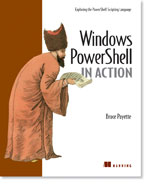/\/\o\/\/ PowerShelled
This blog has moved to http://ThePowerShellGuy.com Greetings /\/\o\/\/ $AtomFeed = ("Atom.xml")$PreviousItems = (" Getting and using a SecurityPrincipal from MSH "," Line Breaks "," MSH Clipboard part 2 (of 3 ?) "," MSH TakeOwner working "," MSH Clipboard use workaround "," [MSH] keyboard status "," playing with MY-object from MSH "," MSH access NT provider "," Update-TypeData (Democracy to the types) "," MSH directory watcher with popup-balloon "," ")
Tuesday, October 25, 2005
Lets Query WMI from MSH
ls,
as I was answering a post in the NG,
about a vbscript to get dependent services
the (corrected) script looks like this :
Dim UnArgs
Set UnArgs = WScript.Arguments.Unnamed
WScript.Echo UnArgs(0)
strComputer = "."
Set objWMIService = GetObject("winmgmts:" _
& "{impersonationLevel=impersonate}!\\" & strComputer & "\root\cimv2")
Set colServiceList = objWMIService.ExecQuery("Associators of " _
& "{Win32_Service.Name='" & UnArgs(0) & "'} Where " _
& "AssocClass=Win32_DependentService " & "Role=Antecedent" )
for each s in colServiceList
WScript.Echo s.name
next
this is a bit more as the standard WMI get propery, and involves more than 1 WMI-class.
I decided to make it in MSH also :.
at first I came with this :
Function GetDep {
$mos = (new-object system.management.ManagementObjectSearcher)
$mos.Query = "Associators of {Win32_Service.Name='" + $Args[0] + "'} Where AssocClass=Win32_DependentService Role=Antecedent"
$mos.get()
}
(you can not use a Moniker to connect to WMI as in VBscript)
But after that I thought .. this may be correct but not realy MSH.
Hence, I did look at the get-WMIObject function.
first how to get only the wanted Class.
the get-WMIObject uses - filter for this :
- get-wmiObject win32_service -filter "Name ="lanmanserver"
then how to get the related class
a Get-Method on the Object revealed the GetRelated Property
hence ,
Function GetServiceDeps {($s = get-wmiObject win32_service -filter "Name = '$($args[0])'").GetRelated("win32_service")}
And Ready ..
Much more Clean, shorter and more MSH
but then again .....maybe NOT..... (c) LSL
I did forget the Role-part this does not matter for "lanmanserver" so I did not see it at first but this will give also the relations the service is dependend on.
OK, lets look again at that Method :
MSH G:\Monad> (get-wmiObject win32_service -filter "Name = 'lanmanserver'").GetRelated.OverloadDefinitions
System.Management.ManagementObjectCollection GetRelated()
System.Management.ManagementObjectCollection GetRelated(String relatedClass)
System.Management.ManagementObjectCollection GetRelated(String relatedClass, String relationshipClass, String relationshipQualifier, String relatedQualifier,String relatedRole, String thisRole, Boolean classDefinitionsOnly, EnumerationOptions options)
(I left out the ASync Methods)Oops, IMNSHO that is not a nice Overload !!!(Quiz Question : You know them All well enough to fill the 3th overload ?)I do now ;-) (see later in post) and it seems that you can keep the ones you don't need empty.it is : MSH G:\Monad> (get-wmiObject win32_service -filter "Name = 'lanmanserver'").GetRelated($null,"Win32_DependentService",$null,$null,$null,"Antecedent",$false,$null)
But then I did not know what to fill in,
but I saw another Method called
- GetRelationShips.
after playing a bit I stopped at :
((($s = get-wmiObject win32_service -filter "Name = 'lanmanserver'").GetRelationships("win32_Dependentservice")) foreach {$_.dependent}).split("=")[1]What do you think ? , In this case I would more like the ".NET" solution ;-)
But.. help was on the way ;-)
while searching SDK's etc for the WQL language specs,
I stumbled upon System.Management.RelationshipQuery
after playing with it (more about how later) I could only make a
- references of -query.
So I needed his brother-class : System.Management.RelatedObjectQuery(System.Management.RelatedObjectQuery is related to GetRelated
and RelationshipQuery to GetRelationships)
.So ... and what can we do with thos 2 classes ?
Translate WQL Query's to Properties and Back !!!
MSH G:\Monad> $roq = new-object System.Management.RelatedObjectQuery
MSH G:\Monad> $roq.QueryString = "associators of {Win32_Service.name='lanmanserver'} where resultclass = win32_service role = Antecedent"
MSH G:\Monad> $roq
IsSchemaQuery : False
SourceObject : Win32_Service.name='lanmanserver'
RelatedClass : win32_service
RelationshipClass :
RelatedQualifier :
RelationshipQualifier :
RelatedRole :
ThisRole : Antecedent
ClassDefinitionsOnly : False
QueryLanguage : WQL
QueryString : associators of {Win32_Service.name='lanmanserver'} wher
e resultclass = win32_service role = Antecedent
So, Now you know How I filled in that 3th Overload of GetRelated ;-)
but at the End, I don't know if i want to, because you can get put the RelatedObjectQuery into a
ManagementObjectSearcher directly. (see last "bonus"-script.)
so until you need more as only the relatedClass (1st/2nd Overload of GetRelated)
get-wmiObject is nice but after that I prefer the "system.management"-Way
And .. as final "Bonus" - script to learn the WMI Queries, I coupled to on my Objectviewer-script, to get a GUI WQL-Querytool :
$roq = new-object System.Management.RelatedObjectQueryIn the MSHObjectviewer you can change the Properties (or the Query), and you will see the effect in the Query(or the properties). You have to change to another field to see the reaction.
ov($roq)
$mos = new-object system.management.ManagementObjectSearcher($roq)
I think now you have enough tools to get some more heavy work done in WMI
Doe er iets leuks mee (have Fun)
gr /\/\o\/\/
PS IF you do not have OV(MSHObject-Viewer), go here : MSH Object Viewer
for more info about WQL queries go to : http://msdn.microsoft.com/library/en-us/wmisdk/wmi/wql_sql_for_wmi.asp?frame=true
